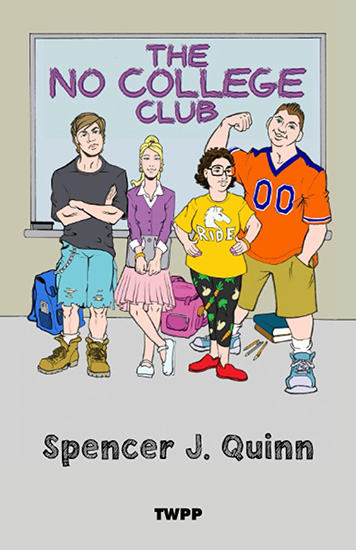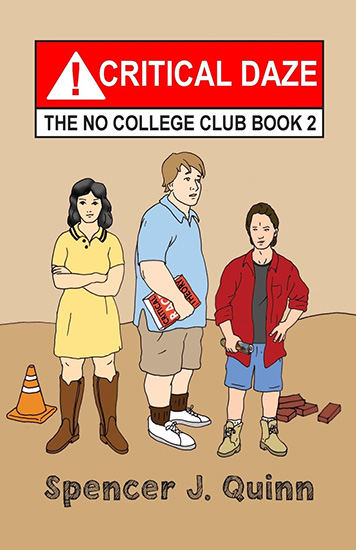Young Adult Race Realism in Fiction
K.M. Breakey, American Renaissance, October 15, 2025
Subscribe to future audio versions of AmRen articles here.
Spencer J. Quinn, The No College Club, The White People’s Press, 2022, 216 pp. $16.99 (soft cover)
Spencer J. Quinn, Critical Daze: The No College Club, Book 2, Counter-Currents Publishing, 2024, 230 pp. $20 (soft cover)
How does pervasive anti-whiteness affect the minds and psyches of young white Americans? How do they navigate the slights and smears? Spencer J. Quinn’s No College Club novels answer many of these questions. They give readers a look at the horrors of modern-day American high schools.
In contemporary fiction, the Young Adult (YA) genre is consumed by progressive madness. Bestsellers showcase diverse characters and woke themes; whites are villains and non-whites are smart and virtuous. If there is an upstanding white male, he’s probably gay or a total simp.
In 2017, The Hate U Give (aka THUG) followed this formula and sold millions, setting the tone for a wave of female black heroines. It relentlessly repeated the message: cops are bad, whites are bad, racism is everywhere.
Spencer J. Quinn, a frequent contributor at Counter-Currents, brings a new perspective to the YA genre, one rooted in race realism. In both of his novels, white protagonists face a choice — tell the truth or sell out. Both choose the hard road, knowing there will be a price to pay. Neither can begin to imagine how high that price will be.
In Book One, sixteen-year-old Caroline is an attractive blonde in a mixed-race high school where whites have recently become a minority. She’s popular and well-liked. Dr. Nogimbe, the history teacher, is a black woman with a big smile and big opinions on race, which she shares constantly. On slavery, Dr. N’s contempt for the white race is impossible to miss. Her commentary riles up the blacks and shames the whites.

But there is a rebel in the class. Derek is a mysterious loner with the gall to challenge her claims. He offer a more well-rounded version of history: Slavery wasn’t unique to America; white people didn’t start slavery, they ended it. Dr. N is outraged but Derek doesn’t back down.
This triggers a racial ripple through the school and Caroline finds herself on the wrong side of the argument. She could solve the problem by apologizing and professing fealty. That is the easy path most would choose, but not Caroline:
“What kind of world are we living in if a person gets punished for telling the truth?” she asked herself. “And why are people blaming whites for their past sins when black sins were just as bad, if not worse?”
Inspired by Derek, and perhaps a little attracted to him, she holds her ground. For this, she pays dearly. We watch in horror as various pieces of the system conspire against her. Her life unravels. Fair-weather friends vanish and social media amplify the backlash and humiliation. Even family members are affected.
In Book Two, Critical Daze, we get to know Will, a large and lovable fellow with a strong sense of fair play. Like Caroline, he doesn’t realize he is immersed in the anti-white ether. But he, too, has an awakening, and this time it’s because of Critical Race Theory. With nudges from his best pal JD, Will realizes that it is “infinite loops of logic . . . nothing anchoring it to reality.”

In a burst of idealism, he tells forbidden truths in a public setting. He suffers gratuitous black-on-white violence, and his life is dismantled.
At this point, Book Two connects with the plot of Book One, and we see what happens to whites who are cast out of polite society. There are betrayals by loved ones, financial hardship, and legal woes, but both novels end with cautiously optimistic futures.
Mr. Quinn is a gifted writer. His novels have fast-moving plots and quirky characters. The prose is tight and the dialog authentic, with dashes of humour and irreverence. And both novels have a love story — that’s one YA rule he wisely chose not to ignore.
Mr. Quinn’s novels are similar in structure and tone to THUG — set in mixed-race schools where dominant racial conflicts are black vs white, with other races in supporting roles. The difference? THUG tells fabricated truths while SJQ tells actual truths.
We need more books like these. If just one hit the bestseller list, it would shift the discourse.
Is this possible? The tides are turning. No one knows what’s possible or not anymore. But we’ll need more than just one. And movies, too. An avalanche of storytelling, which is precisely what our enemies have inflicted on us for decades.
People are fed up with woke slop. Imagine the demand for a cinematic retelling of the George Floyd story that tells the truth. How about a coming-of-age drama called The No College Club starring Sydney Sweeney?
It’s possible. The world is changing. What heroes can we create? What worlds can we imagine? What future leaders can we inspire?















